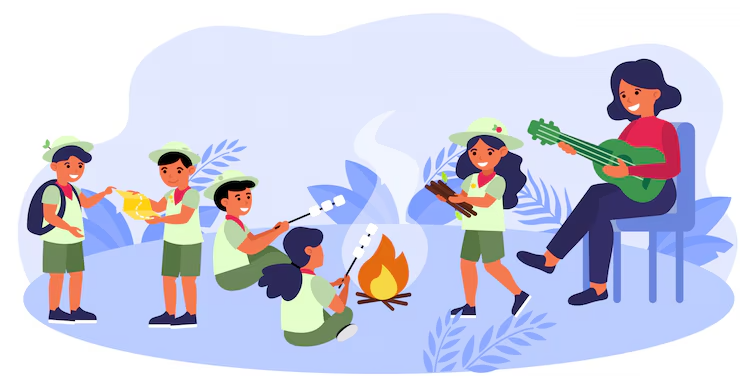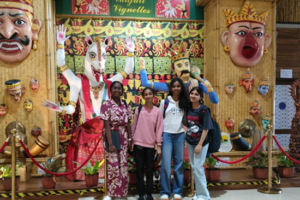
Extracurricular activities are like those special ingredients that add flavour to an individual’s personality. They are differentiators that set a person apart from the rest. It is a great help in modeling personal character, leadership qualities, and societal interactions, and an avenue through which interests, desires, and passions can be pursued.
This blog will discuss how extracurricular activities help to improve student performance, build life skills, and lead to being college- or career-ready. Key points to consider would be the effect on personal development and the ways in which the extracurricular activities may impact future academics and professional life.
What are extracurricular activities?
Extracurricular activities are voluntary activities not part of the regular academic curriculum where students acquire practical skills and knowledge and team up for better interpersonal and communication skills. These activities influence the future academic and professional life of the student. Examples: sports and fine arts like dance, painting, etc.
These activities inculcate teamwork, leadership and time management and enhance social and personal experiences among the students. They even offer a variety of different opportunities, from academic clubs such as robotics to cultural kinds of groups such as drama clubs, that infuse the interest and passion of students beyond learning in the classrooms.
Benefits of Extracurricular Activities
Academic Performance
Involvement in extracurricular activities develops critical thinking and teamwork. For instance, being part of a debate club develops public speaking and analytical abilities; participating in a science fair improves scientific concepts with hands-on experience. Extracurricular activities complement classroom learning experiences by providing applied settings for the theoretical knowledge gained through classroom learning. Moreover, these activities inculcate qualities like leadership and problem-solving in a child. Therefore, encouraging children to participate in these activities helps them in their holistic development.
Personal development
Personal development deals with building crucial life skills like time management, teamwork, and leadership. These skills, once mastered, can lead to better productivity, improved collaboration, and successful leadership. It also includes building self-confidence and high self-esteem. For example, participating in group discussions enhances confidence and improves communication skills. All personal development activities help an individual become more independent, confident, and competent enough to face any obstacle.
Social Skills
Social skills are paramount for one to make new friends and maintain other social contacts. These are some of the skills that expedite relationship building by helping one connect with other parties and understand different dimensions. The social skills developed are not only helpful in personal interactions but also extend to professional networking and life opportunities in general. Only then can one move through social situations more positively, helping to develop oneself and boosting professional advancements.
College Applications
Extracurricular activities are a vital component of college admissions because they demonstrate a well-rounded profile outside of the academic course. It symbolizes the interests of the student and gives a brief insight into the student’s personality and nature. These raise the chances of getting into a good college and leave a positive impression on admissions officers. Involvement in clubs, sports, or volunteer work demonstrates such positive skills as team-building, time management, and taking the initiative. Diversification of activities distinguishes an applicant and might project unique strengths and potential contributions to the college campus.
Career Preparation
An extracurricular activity may help you explore your interests in any field. You can even make a career out of it. For example, if sports excite you and you are really good at them, exploring more of them will facilitate becoming a sportsperson. The skills that one develops while pursuing extracurricular activities do have a long-lasting impact on their career and life. For example, the communication skills that you have built will help you crack interviews and improve networking.
Physical Health And Mental Health
Physical activity may guarantee a list of the following health benefits: cardio-fitness, better mood, and decreased risk of chronic diseases. Physical exercises reduce stress levels and anxiety and improve sleep quality. Extracurricular activities such as sports, hobbies, or any other interest for one’s pleasure can help tremendously with the mental health of an individual. It enables the person to release stress in a more positive manner, and the person has the opportunity to relate with others to create friendship and social interaction, as well as accomplishments.
Challenges of Balancing Extracurricular Activities
-
- Time constraints: extracurricular activities also demand your time and attention to hone your skills further. So maintaining balance between extracurricular activities and academics demands time management.
-
- Lack of resources: Some schools lack adequate resources like specialized teachers and equipment, which hinders the interests of students.
-
- Less encouragement: Schools and parents, in some instances, do not place enough emphasis on these extracurricular activities, which in turn discourages children from pursuing them.
To bridge these gaps, follow these tips:
-
- Prioritize your tasks to be completed within a given timeframe.
-
- Then fill up a time planner, setting aside time for studies and all the activities.
-
- Be sure to leave time for relaxation and personal care.
-
- Review your workload regularly and revise your priorities to maintain a healthy balance.
How To Choose the Right Extracurricular Activities?
-
- Start choosing the right extracurricular activities by looking at your areas of interest.
-
- Look for activities that pertain to these passions and skills.
-
- But do not miss out on exploring new things outside your comfort zone.
-
- Research different options and look at time commitments and benefits.
-
- Reach out to school clubs, community organizations, or online groups to get details and directions.
-
- Find something and then take the initiative to go: to meetings, to events, to volunteer.
The Role of Schools in Promoting Extracurricular Activities
Usually, students develop or learn about extracurriculars in schools. Schools are at the forefront of promoting extracurricular activities that build the interest and talents of students. Having a wide spectrum of activities ranging from sports to arts and clubs in academia provides the students with a window of exploration for the areas that interest them, and schools help in discovering passion and skill development. Schools can support participation through factors such as accessibility, convenience of time scheduling, and an inclusive environment.
Encouragement by teachers as well as recognition of students’ achievements and inclusion of such activities into the culture of the school provide more significant support for involvement. So, conducting programs frequently will improve students’ engagement and development.
Conclusion
Extracurricular activities contribute a lot to a student’s growth and development since most of the skills developed are not learned in a class setting. They enhance personal growth, give a sense of belonging, and may be a significant booster for the college application. Students should be encouraged to explore these activities further so that they bring out the best in them and find their passion. Extracurricular activities no doubt enhance the educational process but yield ripple effects on both the personal and professional growth of students as they nurture all-rounded individuals who are prepared to take on future challenges with confidence and versatility.
Extracurricular activities are vital for building leadership, confidence, and creativity in students. When supported with physical education and yoga practices, they provide a holistic foundation. These experiences complement academic rigor for all-round development. That’s why New Horizon Gurukul is trusted among best cbse schools in bangalore and favored as one of the top schools in bangalore.
Frequently Asked Questions (FAQs)
What are extracurricular activities, and why are they so important?
Extracurricular activities may be defined as immeasurable educational activities for students. For instance, sports, fine arts, etc., enhance students’ skills, personal growth, and coordination. They are important since they help develop other abilities in students, which in turn boost their confidence and provide a balanced and enriching experience apart from academics.
How do extracurricular activities benefit academic performance?
Extracurricular activities enhance a student’s academic performance by teaching them how to manage their time, be disciplined in their actions, and lower stress. It also improves social skills and builds teamwork, giving a well-rounded education that turns into improved focus with high motivation in academics.
What are the best extracurricular activities for college applications?The best extracurriculars for
college applications include leadership roles, community service, academic clubs, sports, and unique personal projects. Concentrate on activities in which you can record commitment, impact, and growth, which would be aligned with your interests and your area of intended studies.
How can students balance academics and extracurricular activities effectively?
Students can balance academics and extracurricular activities by having clear priorities, a structured schedule, keeping themselves organized, and using their time wisely. There should be communication with the teachers and activity leaders to ensure manageable commitments and avoid burnout.
What role do schools play in supporting extracurricular activities?
Schools support extracurricular activities by conducting special classes, holding competitions, and felicitating the winners. Through a variety of programs, they work to engage students, help their personal development, and create a spirit of teamwork in them. All this helps students discover interests outside of academics and learn many other skills that are valuable in life.




